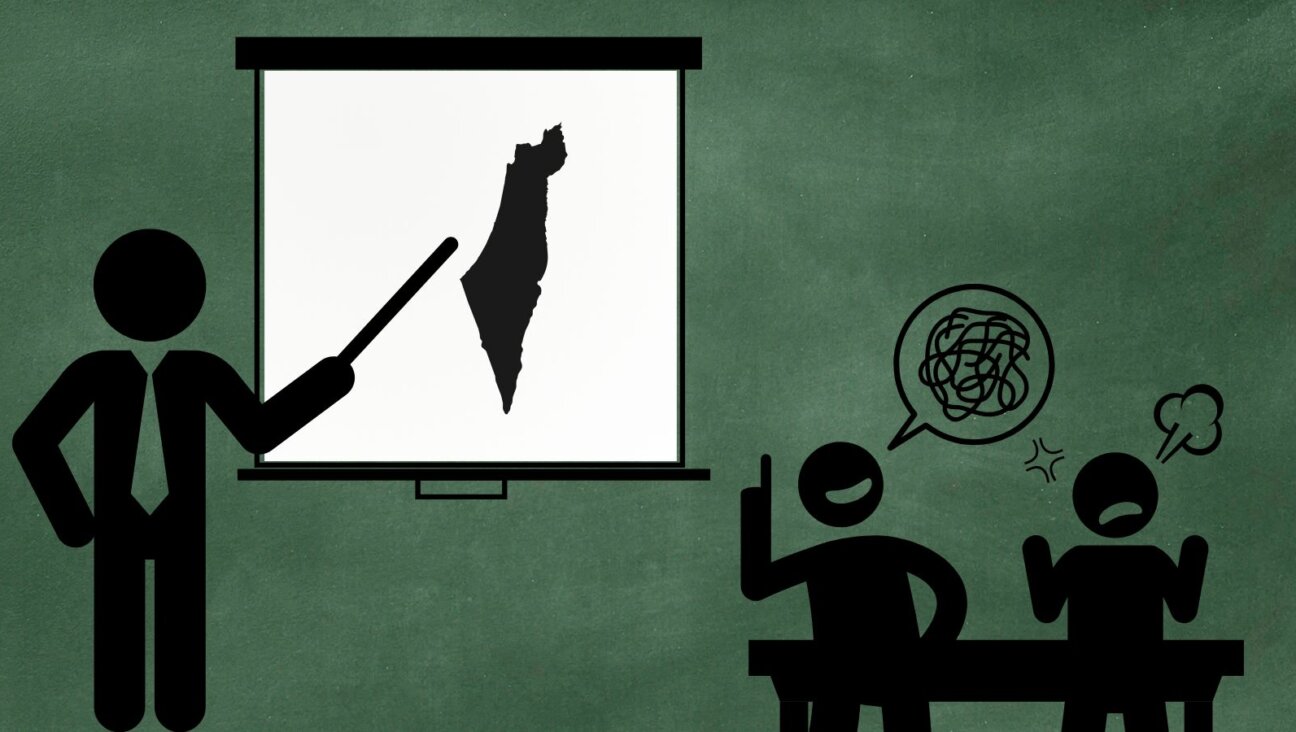For One Teen, Getting a Jewish Education Was a Form of Rebellion

New Jew: Lilit Marcus says her parents? hands-off approach allowed her to explore Judaism on her own terms. Image by Thinkstock
Someone once asked Pamela Anderson — the regular Playboy centerfold and “Baywatch” star — what she thought her two sons would be like when they grew up. She joked that in order to rebel against her, they would probably become accountants.
Though the quote seemed like a throwaway comment, it creeps back into my mind occasionally when I think about my own upbringing. It’s normal for kids to rebel against their parents or try to make a dramatic turn from the way that they grew up. My parents have an interfaith marriage (Dad’s Jewish, Mom’s Presbyterian) and never encouraged me to be involved with a particular religion. No bat mitzvah, nothing. And yet somehow I grew up eager to learn about world religions, embraced Judaism as my spiritual path and eventually worked as a religion reporter.

Lilit Marcus Image by Courtesy of the author
For many of my close friends, though, exactly the opposite happened. Having grown up in kosher homes, declining invitations to birthday parties that took place on Friday nights and spending years in boys-only or girls-only yeshivas, many of them now rebel against Judaism. Most of the people I know who eat bacon for breakfast and are highly critical of Israel are people who grew up in Jewish homes and think that religion was “forced on them.”
Yes, this is all anecdotal evidence. But it also made me wonder if the best way to raise a child who embraces Judaism is not to spend thousands on summer camps, day schools, bat mitzvah training and confirmation, but to back off and let that kid come to the faith on her own. If kids are going to rebel, don’t you want to trick them into rebelling in the least rebellious way possible?
I reached out to people who work in Jewish education to ask them about my early-education theory. Unsurprisingly, I got a lot of blank stares and prolonged silences. After all, why would a person who makes his or her living teaching kids about Judaism want to say that his or her line of work didn’t really matter? It is like asking a reporter to say that newspapers are obsolete and that kids should never read books.
But Bethamie Horowitz, a professor of humanities and social sciences at New York University who researches Jewish identity formation, didn’t disregard my theory outright. “The story you’re telling is a complicated one to tell through qualitative studies,” she told me. In her study, “Connections and Journeys,” she interviewed Jewish adults about how their Jewish identities and relationships evolved throughout their lives. “If you get on with your family, as a general rule, and there’s a loving relationship with no great disruption, you will fall close to the apple tree,” she says, noting that it’s not always the case — sometimes, a major positive or negative life event can send someone off in another direction.
That fits in with the stories of people I knew who had become way more or way less religious than their parents. In one friend’s case, a parent’s sudden death sent her careening away from Judaism as she struggled with her grief. In another, a troubled childhood and a search for structure had sent someone straight into the arms of an organized, routine-driven Orthodox life.
Horowitz also pointed out that students are influenced by their schoolteachers as they develop their interests and identities. Teachers at Jewish schools have the extra charge of inculcating a love of Judaism in addition to teaching the course material. “A great teacher anywhere can make a difference, but bad ones get framed as a bad Jewish education,” she said.
But what about me? Unlike the people in Horowitz’s study, there was no single event for me, no holy smoking gun. As a kid, my parents exposed me and my sibling to a bit of both religious traditions but otherwise backed off from making us pick a team. I grew up in the South, where I went to public school with a lot of evangelical kids whose first question to a new student was “What’s your name?” and second was “Which church do you go to?”
Looking back, my early interest in Judaism was a way of rejecting the Christian culture that I felt rejected by. Considering I couldn’t even tell you what Jewish people thought or believed, “Jewish” was just my way of being a weird kid. It was the word I used instead of “goth” or “freak” or “artist.” Instead of black lipstick or a nose ring, I picked a Star of David.
For some reason, I stuck with Judaism. On the first Friday night of college, I showed up at my campus’s sad little Hillel, which shared space with the almost-as-small Catholic Student Union. (Because I attended a Southern public university, the Campus Crusade for Christ had two rooms and an off-campus meeting space.) A dozen of us put together a sign-up sheet for who would bring kosher food and lead services week to week. Then I realized that I had no idea how to lead services, what happened in a service, what all those Hebrew words in the service meant or how food that didn’t contain pork products could still not be kosher. I never went back.
During my aborted attempt to join Hillel, I discovered the existence of a program called Taglit-Birthright Israel, which I finally went on during the Christmas — not “winter holiday,” the school called it “Christmas” — break of my senior year. I was placed on an “orphan trip,” which consisted of students whose Hillels and on-campus Jewish organizations were too small or poor to put together their own trips. The trip had an arts-and-culture focus, which meant that between visits to the Kotel and Masada we would also learn how to paint things and do improv. But my “I’ll finally magically learn everything about Judaism simply by setting foot in the Holy Land” plan was a disaster from the beginning. Instead of a direct El Al flight, our group ended up on a wayward series of planes from New York to Reykjavik to Amsterdam to Tel Aviv, arriving a day and a half late. We packed 10 days’ worth of sightseeing into eight, and the jet lag never went away. I was 21 and panicking about what I was going to do in six months. Most of the other students were 18 and obsessed with legal drinking and making out with soldiers. I had forgotten all of their names by the time I arrived back home.
When I came up with a plan of sorts six months later — it involved a bus to Manhattan and an unpaid internship disguised as a job — I thought that I might find myself, or at least my Jewish self, through some sort of New York City magic. At a mixer for young Jews who had just moved to the city, one girl mentioned that she only really hung out with “eco-kashrut Reconstructionist Jews,” to which I replied, “There are enough of those people that you have friends?”
Soon, though, there were all kinds of Jews in my life, everywhere. A new friend invited me to something I’d never heard of before — a minyan. It met in his West Village apartment. It was the first time I hadn’t been terrified or intimidated at a religious service. There was a mix of Hebrew and English, with a transliterated siddur so that I could actually understand what I was supposed to be thanking G-d for. A rabbinical student whispered in my ear when new parts of the service came up so that I could know what was going on and why.
It wasn’t perfect, and it wasn’t anything my great-grandparents would have recognized as a synagogue, but it was the first time in my life that I had ever loved being Jewish for its own sake, not because it marked me as cool or different.
Had my parents inculcated a love of Judaism in me, would I have found myself in that West Village apartment? I doubt it.
Lilit Marcus is the author of “Save the Assistants: A Guide for Surviving and Thriving in the Workplace” (Hyperion). She has written for the Wall Street Journal, Glamour, Blackbook and The Atlantic.
A message from our CEO & publisher Rachel Fishman Feddersen

I hope you appreciated this article. Before you go, I’d like to ask you to please support the Forward’s award-winning, nonprofit journalism during this critical time.
We’ve set a goal to raise $260,000 by December 31. That’s an ambitious goal, but one that will give us the resources we need to invest in the high quality news, opinion, analysis and cultural coverage that isn’t available anywhere else.
If you feel inspired to make an impact, now is the time to give something back. Join us as a member at your most generous level.
— Rachel Fishman Feddersen, Publisher and CEO






















